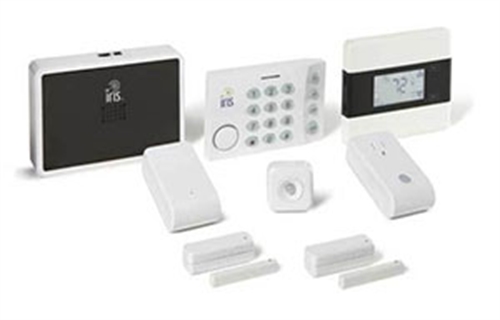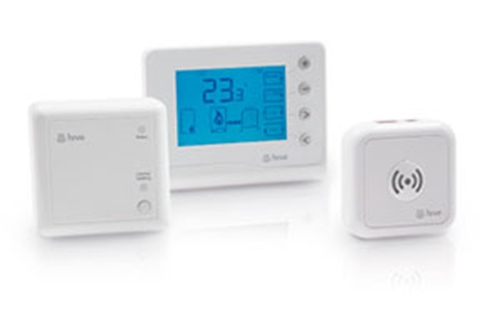Existing Suppliers
We have taken a particular interest in two systems; Iris by Lowe’s in the USA, and Hive, which is part of British Gas, in the UK. They also represent an approach that is common amongst most existing home automation systems.
AlertMe
The Iris by Lowe's and Hive systems are both the result of the original pioneering development work undertaken by AlertMe. They both inherited the AlertMe concept of several smart devices and a hub in the home, and a cloud based service to control the system, both in the home, and remotely.
They are also both system suppliers, as distinct from the many suppliers that are now offering individual smart devices.
Iris by Lowe’s

Starting with the same AlertMe range of ZigBee devices, Lowe’s increased the Iris range relatively quickly to include Z-Wave devices, all of which were sourced from third parties.
This expanded the Iris range beyond motion sensors, contact sensors, buttons, etc. to include light switches, smoke detectors, door locks, and many more.
Lowe’s has recently announced its intention to sell the Iris business.
This process began much earlier, with Lowe’s starting to sell a wider range of home automation products, and then SmartThings systems and devices in August 2017.
Since then, Lowes has abandoned the 1st generation Iris system, along with its devices. It has also continued to expand its range of smart homes products, to the extent that Iris devices are now a minority product.
It is difficult to see the value in Iris to a potential buyer, especially in the light of the changes taking place in this sector. The most likely outcome is some form of shutdown.
In anticipation of a shutdown, Lowe's may want to continue to support its existing Iris users, at last for a period of time.
If so, it would make sense for Lowe’s to abandon immediately the marketing of the Iris products, and any future product development. Other departments can probably also be paired down without impacting existing users. Technical / customer support will probably need to be continued for some time, as will the cloud based service.
It seems likely that Lowe’s will have run down its stock of Iris own brand devices, both because of the reduced marketing of these devices, and in anticipation of their abandonment, one way or the other.
Lowe’s is also likely to have existing contractual commitments with customers, partners and suppliers, which may take it some time to discharge. The revenue from existing subscriptions may go some way to offset the cost of any continuing customer contracts.
On this basis, it’s reasonable to expect that any shutdown with be measured in months, rather than weeks.
Modified January 31st, 2019
Wrong, wrong wrong!
Iris has just formally announced that it is shutting down on March 31st, 2019. Existing users will be reimbursed for their 1st generation devices, but can retain them.
The anticipated end of the Iris business raises similar questions about other home automation suppliers.
Hive / British Gas

Hive is probably the largest supplier in the UK. This is due mainly to the smart heating system, for which British Gas, the owner of Hive, has a large existing customer base. Apart from these customers, Hive has a much smaller customer base than Iris, and is generally supplying less advanced users.
British Gas focused initially on using AlertMe’s technology for smart heating systems. These comprised a portable thermostat, a heating receiver, and a hub, as well as the cloud based controlling software.
It then expanded its range by reintroducing other AlertMe devices, and adding more ZigBee devices, which also carry the Hive brand.
Despite having spent a total of some £60M in both investing in AlertMe, and then acquiring it, Hive appears to be in a less sustainable position than Iris, apart from its British Gas heating systems.
It has a much more limited range of devices than Iris, and a far less capable system. It has invested in new own-brand products, but these are being outshone by the multitude of cheaper and better devices from other manufacturers. It also appears to be encountering many more user problems than Iris, especially in relation to the size of its user base.
To some degree, Iris and Hive typify many of the system suppliers in the home automation market. There is a common thread. They need to support legacy products and legacy software, and rely on expensive cloud based services to control these systems.
The Achilles’s Heel
The main weakness in the design of these, and other similar systems, is their dependency on the user having an Internet connection, the implementation of which has failed to live up to expectation for many users, due to its lack of speed and reliability.
The cloud processing is also costly and complex, and is also unable to exercise direct control over the devices in a home automation system, due to the store and forward role of the hub.